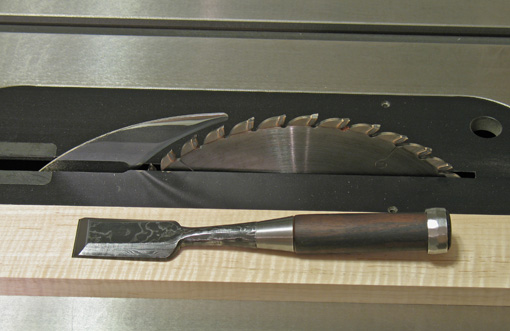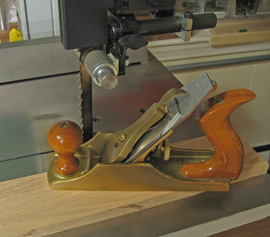The late Tage Frid wrote, in his 1979 book Tage Frid Teaches Woodworking, “I don’t care how it is made – he [the craftsman] can make it with his teeth or a machine – it is still the final product that counts.”
Sure, tools and methodology are essentially means to an end. However, the way we accomplish things and the nature of our work life are important too. This is particularly true for the avocational woodworker who is under less production pressure than a full-time professional and thus has the luxury of choice as to how he feels while he is working. In general, I feel better when I’m using my hand tools than when I’m using my power tools, and so there’s one point in favor of hand tools. I also feel good when I see steady progress through the stock preparation phase of a project along with the repeatable precision of machine work, and so score a couple for electricity.

Yet, there’s more to this issue. Hand tool woodworking is a mentality, an approach, almost a philosophy. It does not mean the absence of power machinery. Rather, I believe the hand tool woodworker is one who recognizes that he can impart degrees of quality and personalization to his work with hand tools that are unlikely or impossible with machinery. This applies to two aspects of woodworking.
The first is methodology. The hand tool worker thinks and plans work differently than those ruled by machines. Processes are incremental. For example, relying only on the table saw to crosscut a drawer front is not likely to produce as excellent a fit as shooting with a hand plane, where fitting can be done in increments of just a couple thousandths of an inch. This level of control builds a relaxed confidence.
Hand tools also allow for error compensation and avoid error build up. For example, in making tenons on the table saw, a machine woodworker is likely to measure stock thickness and assume a sort of perfection, even though the slightest inconsistency in stock thickness can create poor fitting tenons. A hand tool woodworker would work from one reference face of the stock, cancelling small imperfections in stock thickness. If he did use the table saw to make the tenons, he would adjust the machine with a one-sided tolerance, mindful that he can later remove a shaving or two with a plane if necessary to produce an ideal fit. Machines, yes, but on your own terms.
The second aspect of hand tool work has to do with the aesthetics it engenders. Interesting joinery, resplendent surfaces, subtly treated edges, and satisfying contours are some of the distinguishing personalized features we are at ease producing with hand tools. One may use a bandsaw to do most of the work of creating a pleasing contour on a table leg, but a spokeshave and rasps will refine it to a quality that a power sander alone is not likely to achieve. Maybe a round-over router bit gets an edge close to what you want, but a plane gradually alters the mathematically produced edge to something that is less readily definable, but is just what you want. The vision, the work, and the product are personal.
It’s nice to drive to the mountains and even drive through the mountains, but it’s not as nice as hiking them. Power tools drive you there, but hand tools walk you through.


Interesting thoughts and well said. As a hobby woodworker, I like hand tools. If it were my living (unless I were making reproductions), I would probably use power tools to a great extent.k
If I were a high end studio furniture maker, I would probably use a broad selection of hand and power tools to produce the best possible result.
In hobby woodworking, it is often about the process more than the product. For that reason, I think hand tools are very appropriate for a lot of woodworkers. I understand that many will seek their own comfort level still looking to sawmills, planers, bandsaws, and so forth for the rough brute work.
In production woodworking, it is about the economics and speed. In very high end work, it is about the product.
There is something about hand tools that a lot of us find to be more satisfying. Some find hand tools to be pure frustration. That may be because they are highly focused on production, or more likely because they have never really learned hand tools.
Thanks for your excellent blog. This post on handtool/powertool use expressed exactly how I feel about the subject, and does a good job of explaining “blended woodworking”. You write very well; I may have had these same thoughts but I don’t have the ability to put them into words like you do.
Hi Luke,
Thanks for the fine comment. I also think that those who learn hand work at the outset will later become better craftsmen, regardless of their mode of work.
Rob
Hi Amos,
Thanks, I appreciate your response.
Rob
Hey Rob-
Fine job on outlining the differences/tensions between the two woodworking modes. Allow me to add the following thoughts, sort of responding to Luke’s comments above as well.
I’ve just recently turned pro, and the first thing I thought I would have to do is hang my Galoot head and boost up my power tool arsenal for all the above reasons. I discovered two things: 1. There is a significant market for hand tool work (and the buyer has learned to tell the difference.) 2. There are actually a lot of things that can be done by hand quicker than with power tools! That seems counter-intuitive, but if it takes you an hour to get your table saw tenoning jig set up and the cheeks cut, when you can grab a mortising guage and tenon saw and have the tenon cut in 5 minutes, then it pays to work on your tenoning skills.
Food for thought!
Mack,
Yeah, especially for one-of-a-kind work. Thanks.
Rob
Rob: What a great post. Very well said.
Thanks Keith.
Video work such as yours at woodtreks.com is a good way to bring an appreciation of hand craftsmanship to the buying public.
Rob I’ve enjoyed reading, Who is a hand tool woodworker and all the comments very much. Thank you!
I grew up thinking I needed lots of tools and everyone seem to be marketing and selling POWER tools. Personally, I’ve learned over time that I enjoy the creative process more because of hand tools. I’ve also found them to be far safer, easier to use, at times faster, and far more affordable. Plus one can do woodworking in places like an apartment where lots of dust and noise of power tools would be out of the question. Lastly, I think a lot about all the talk of climate change and sustainable living, I believe we’ll soon see a resurgence of self-made things using hand tools and more often made with recycled materials, especially wood, stone and glass.
Bill,
You’re most welcome and I appreciate your interest. Thanks for your comments with more good features of hand tool woodworking.
Rob